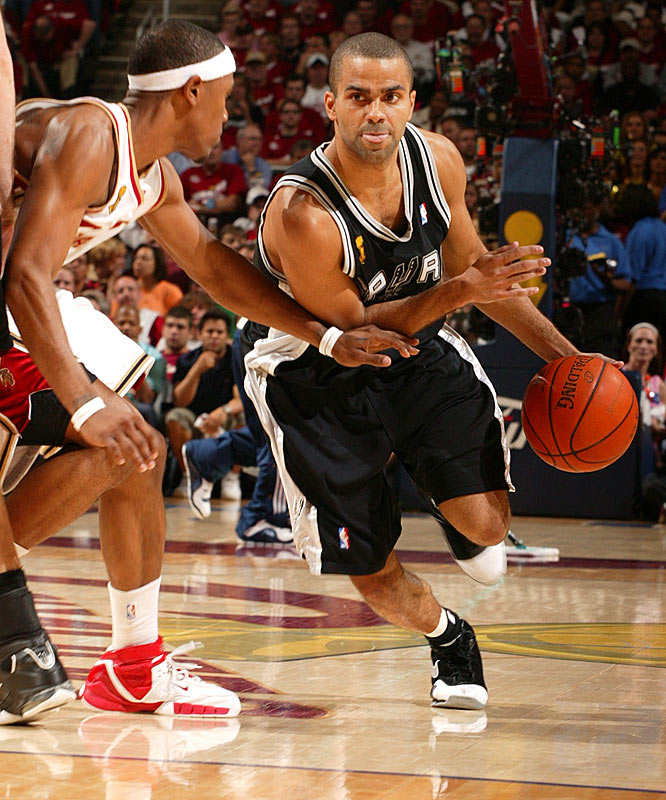
Tony Parker and the Spurs needed only 20 playoff games (16-4 record) to claim the franchise's fourth title in 2007. Parker, who averaged nearly 25 points and shot 57 percent in the Finals, would edge teammate Tim Duncan for MVP honors. Photo: Bob Rosato/SI
It might seem like a ridiculous question to ask. Of course sweeps matter, right?
Conventional wisdom has it that rest is paramount for older teams and older players. Pop has made resting his older players a science, and a source of frustration to fans and the league, during the regular season.
In the playoffs, the team doing the sweeping in the first round gets more rest, which gives them an advantage in the semifinals, which leads to more success in the conference finals and Finals, right?
But too much rest can be a problem, too. We’ve seen it before with the Spurs. A few days off the court and shots can get rusty, passes just a bit less accurate, the team out-of-sync on both ends of the court.
Not one of Yahoo’s five basketball analysts predicted the Spurs would sweep the Jazz in the first round. (Neither did I, but several fellow Spurs bloggers did, including Wayne and Bart of The Big Fundamental, Tim of 48 Minutes of Hell, and Tim of Pounding the Rock.)
And yet, the Spurs have won the first three games of the series by a combined 58 points, despite the fact that Manu Ginobili has scored only 17 points on 7-of-22 shooting. A sweep tonight seems imminent, if not simply likely, no matter what adjustments the Jazz make.
So my question is, despite what we think we know to be true about sweeps, and the additional rest that they produce, is sweeping opponents a predictor of success? In other words, do sweeps matter?
Since the 2002-2003 season, the year the NBA went from a best-of-5 to best-of-7 in the first round, the results are pretty clear.
In those nine seasons, in 135 series, only 22 (16%) resulted in a sweep. Of those, 13 were in the first round, 7 were in the semifinals, 1 was in the conference finals and 1 was in the Finals.
Among the 13 teams who swept their opponent in the first round, only 3 (23%) made it to the Finals.
Of the 20 teams who swept their opponent in the first or second round, just 6 (30%) made it to the Finals, and only 2 (10%) won the title.
Put another way, among the 18 teams in the Finals the last nine seasons, only 7 (39%) swept an opponent in any round.
Ok, but what about rest? Do teams in the Finals that have played fewer playoff games, i.e. had more rest, fare better than those who have played more?
Not necessarily.
In three seasons, both Finals teams played the same number of playoff games. (That was true in 2007, when the Spurs faced the Cavaliers and swept them.)
In the other six seasons, the results based on rest are split 50/50.
The Lakers in 2010 and 2009 and the Spurs in 2005 beat an opponent in the Finals who had played more playoff games.
The Celtics in 2008, the Pistons in 2004 and the Spurs in 2003 beat an opponent in the Finals who had played fewer games.
What holds true for the league holds true for the Spurs, as well.
They’ve only swept opponents in two seasons.
In 2004, the Spurs swept the Grizzlies in the first round, but were eliminated by the Lakers in the next round.
In 2007, the Spurs played 5-, 6- and 5-game series, to finally sweep the Cavaliers in the Finals, who had themselves swept the Wizards in the first round.
The Spurs beat the Pistons in 2005 after having played two fewer games to get to the Finals.
But lest that seem significant, the Spurs beat the Nets in 2003 despite having played four more games than that team in the first three rounds. The Spurs played 6-game series against the Suns, Lakers and Mavericks, while the Nets beat the Bucks in 6, then swept the Celtics and Pistons before losing to the Spurs in 6.
Bottom line? Sweeps don’t matter.
However, I still want to see the Spurs get the broom out tonight.


GREAT article!